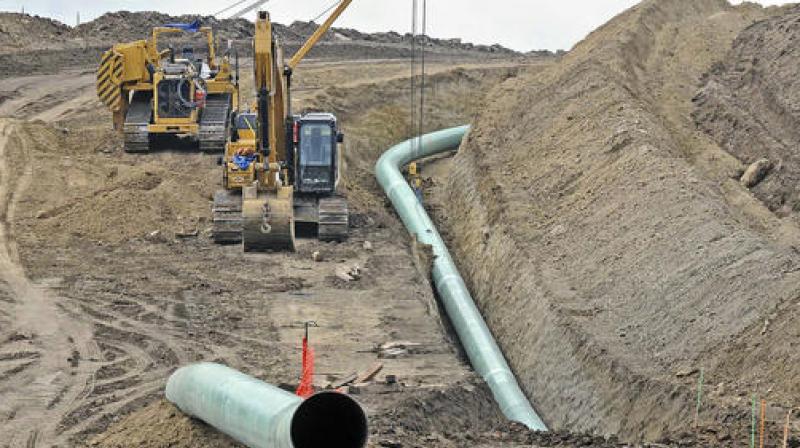Dakota Access opponents urge action as Army consent looms
The Army said on Tuesday that it will allow the four-state pipeline to cross under a Missouri River reservoir in North Dakota.

Bismarck: Opponents of the Dakota Access oil pipeline called for protests around the world Wednesday as the Army prepared to greenlight the final stage of the $3.8 billion project's construction.
The Army said on Tuesday that it will allow the four-state pipeline to cross under a Missouri River reservoir in North Dakota, the last big chunk of construction. The Standing Rock Sioux, which has led the battle against the project for months, promised to fight the development in court. The Army's permission could come as early as Wednesday.
The Justice Department said in court documents filed Tuesday that the Army intends to cancel further environmental study and allow the Lake Oahe crossing. The Army is involved in pipeline approval under the river because the Army Corps of Engineers branch manages the river and its system of hydroelectric dams, which is owned by the federal government.
The 1,200-mile pipeline would carry North Dakota oil through the Dakotas and Iowa to a shipping point in Illinois. Dallas-based developer Energy Transfer Partners had hoped to have the pipeline operating by the end of 2016, but construction has been stalled while the Corps and the company battled in court over the crossing.
Tribal members dubbed Wednesday "#NODAPL Last Stand" day, and urged "emergency actions" via social media. Protesters posted a list online of about two dozen events planned for Wednesday in the U.S. and Canada.
The Standing Rock Sioux, whose reservation is just downstream from the crossing, fears a pipeline leak would pollute its drinking water. The tribe has led protests that drew at times thousands of people who dubbed themselves "water protectors" to an encampment near the crossing. ETP has said the pipeline will be safe.
The camp's population has recently thinned to fewer than 300, and the Corps has notified the remaining protesters that the government-owned land will be closed Feb. 22. Protesters and police have at times clashed, leading to nearly 700 arrests.
An assessment conducted last year determined the crossing would not have a significant impact on the environment. However, then-Assistant Army Secretary for Civil Works Jo-Ellen Darcy on Dec. 4 declined to issue permission for the crossing, saying a broader environmental study was warranted.
The Corps launched a study of the crossing on Jan. 18. President Donald Trump signed an executive action Jan. 24 telling the Corps to quickly reconsider Darcy's decision.
The court documents filed Tuesday include a proposed Federal Register notice terminating the study.
"I have determined that there is no cause for completing any additional environmental analysis," Acting Assistant Army Secretary Douglas Lamont said in a memo.
The Standing Rock Sioux argues that under the Fort Laramie Treaties of 1851 and 1888, the federal government is obliged to consider a tribe's welfare when making decisions that affect the tribe.
"The Obama administration correctly found that the tribe's treaty rights needed to be respected, and that the easement should not be granted without further review and consideration of alternative crossing locations," Tribal attorney Jan Hasselman said. "Trump's reversal of that decision continues a historic pattern of broken promises to Indian Tribes and violation of treaty rights. They will be held accountable in court."
ETP is poised to begin drilling under Lake Oahe as soon as it has approval. Workers have drilled entry and exit holes for the crossing, and oil has been put in the pipeline leading up to the lake in anticipation of finishing the project. CEO Kelcy Warren has said the company should be able to finish the project in about three months once it has the go-ahead.

